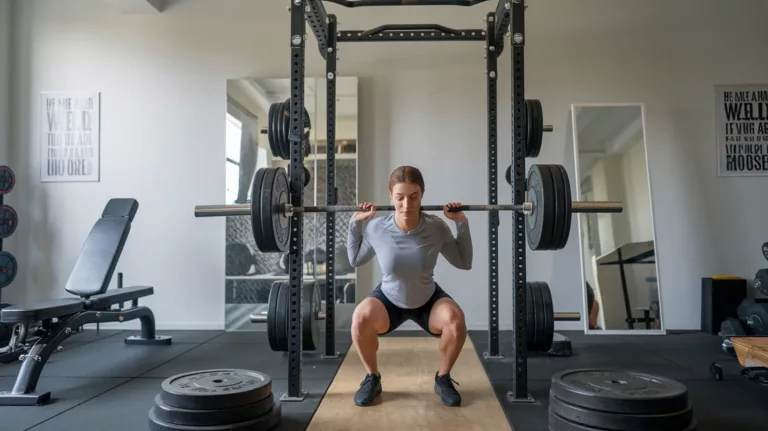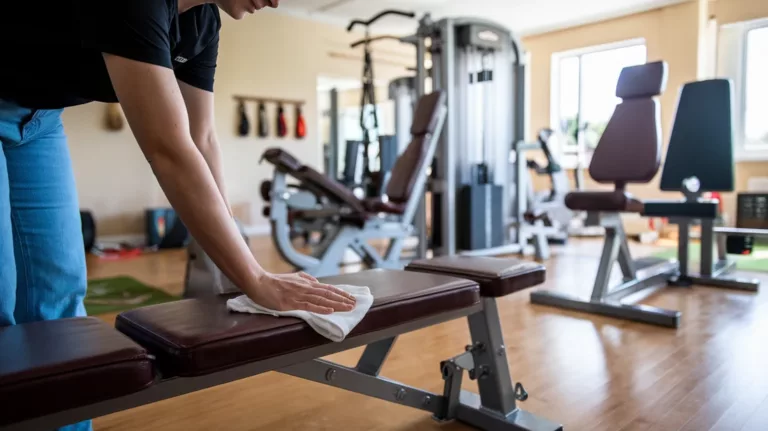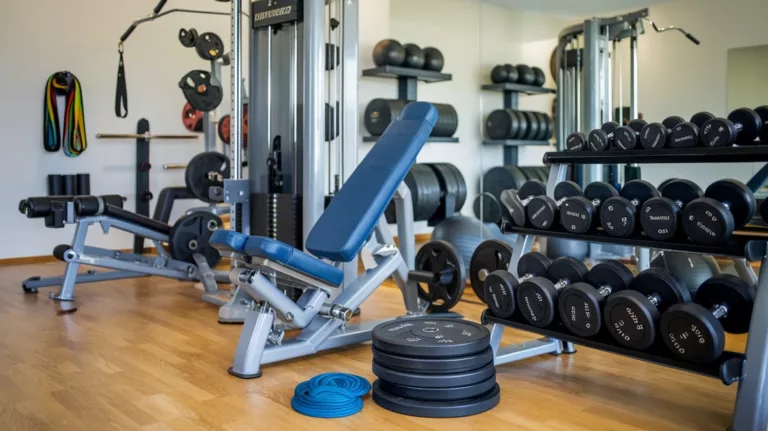Hey there, fitness enthusiasts! Are you ready to take your leg workouts to the next level?
Let’s talk about resistance bands – a secret weapon for building strength, toning muscles, and achieving those leg goals you’ve been dreaming of.
The best part?
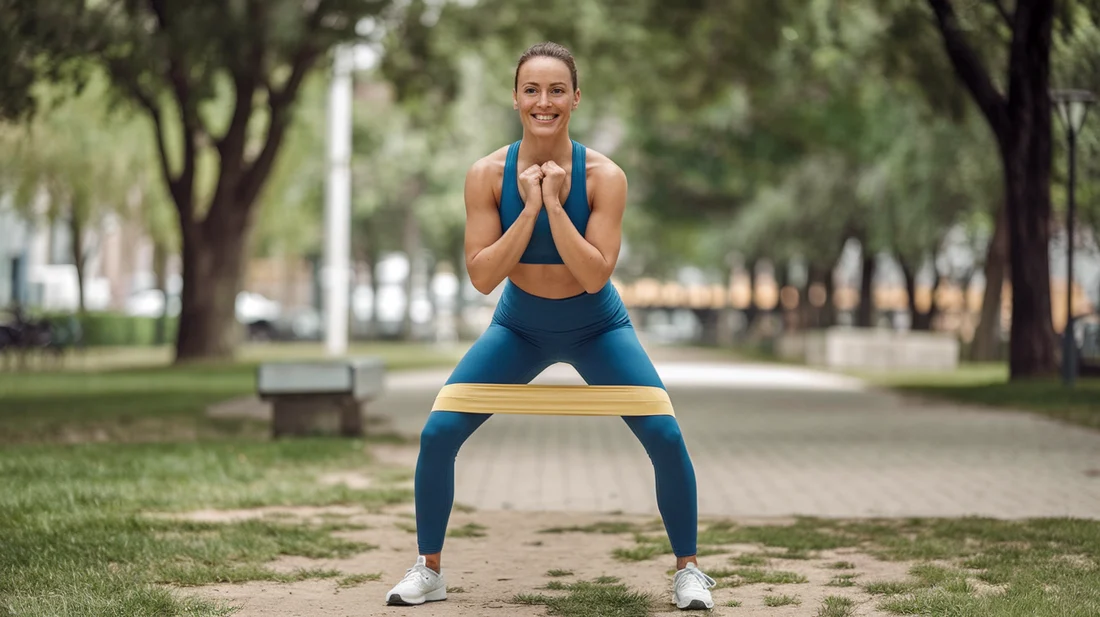
You can do it all from the comfort of your home, at the gym, or even on vacation.
No bulky weights or fancy equipment required!
Understanding Resistance Bands – Your Personal Guide
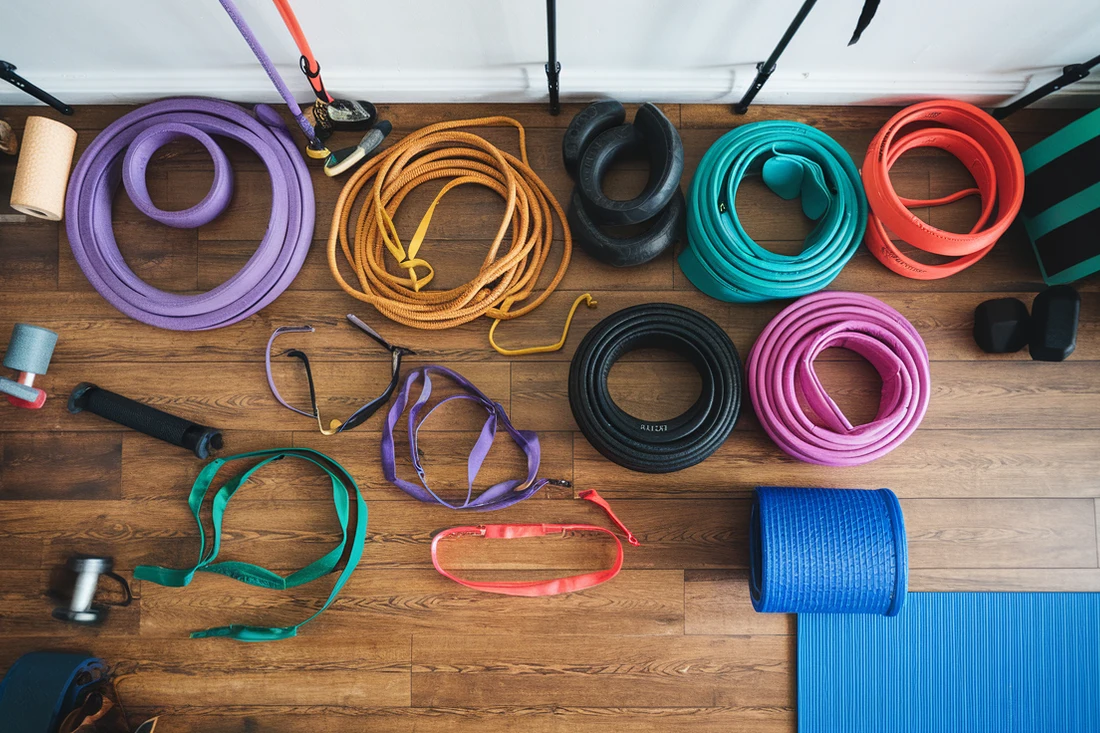
Before we jump into the exercises, let’s get familiar with these awesome tools.
Resistance bands come in different forms, each with unique benefits:
- Mini bands: These small, looped bands are perfect for adding resistance to glute bridges, squats, and lateral walks. They’re like little powerhouses that pack a punch!
- Loop bands: Similar to mini bands but slightly larger, they offer more versatility and can be used for both upper and lower body exercises.
- Tube bands: These come with handles, making them comfortable to grip for exercises like bicep curls, tricep extensions, and rows.
- Therapy bands: Flatter and wider than tube bands, they’re often used for rehabilitation and flexibility exercises.
Resistance bands also come in various resistance levels, usually categorized as light, medium, or heavy.
Start with a lighter band and gradually increase the resistance as you get stronger.
It’s important to choose a band that allows you to complete 12 to 15 reps of an exercise, working to get in those last few reps but maintaining good form.
If your form starts to suffer, it’s time to choose a lighter band.
If you can breeze through 15 reps, try a heavier band.
Pro Tip: Invest in high-quality resistance bands from reputable brands. Trust me, you’ll want bands that can handle your workouts and last for the long haul!
Brands like Theraband, X Bands, and Women’s Best are all great options.
Let’s Get Moving – Effective Resistance Band Leg Exercises
Now for the fun part—the exercises!
We’ll break these down by muscle group to make things super easy to follow.
Glutes – Sculpt and Strengthen
Glute bridges
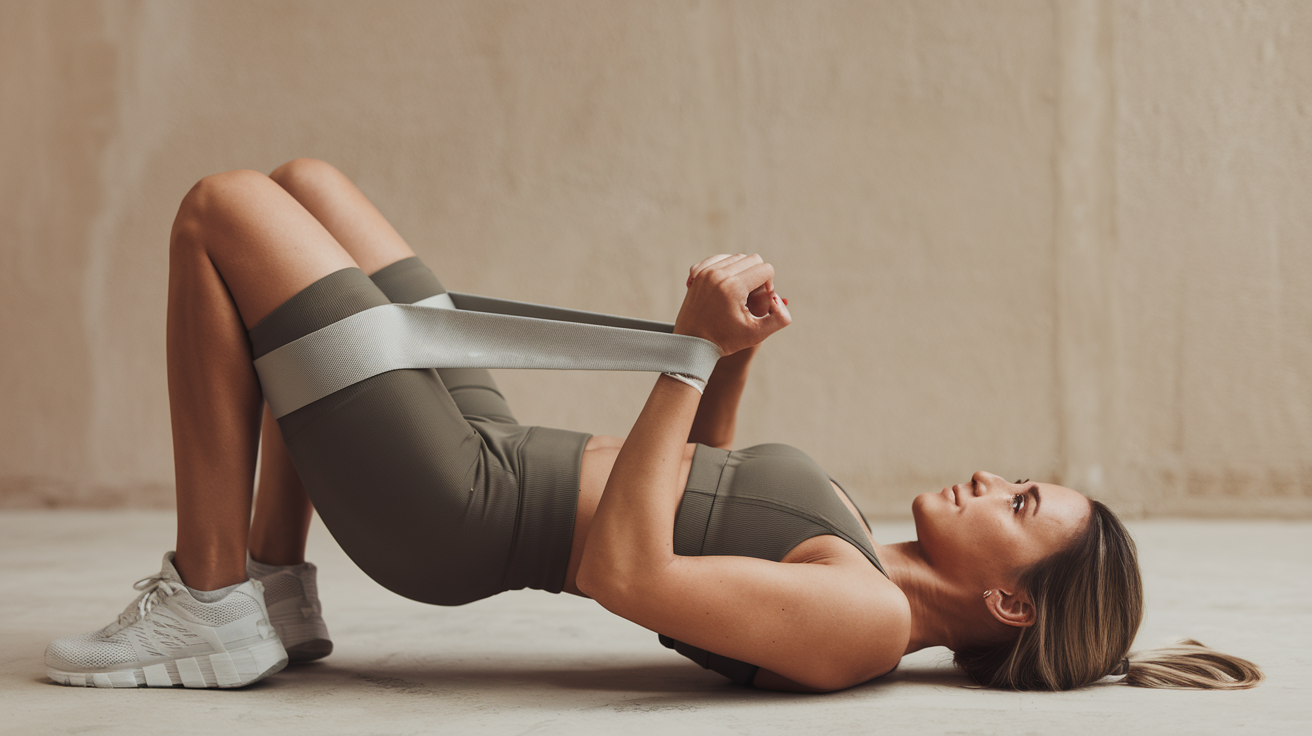
Lie on your back with your knees bent and feet flat on the floor.
Loop a mini band around your legs, just above your knees.
Push through your heels to lift your hips toward the ceiling, squeezing your glutes at the top.
Lower back down with control.
Remember to keep your knees pushed out against the band to activate those outer glute muscles.
Standing kickbacks
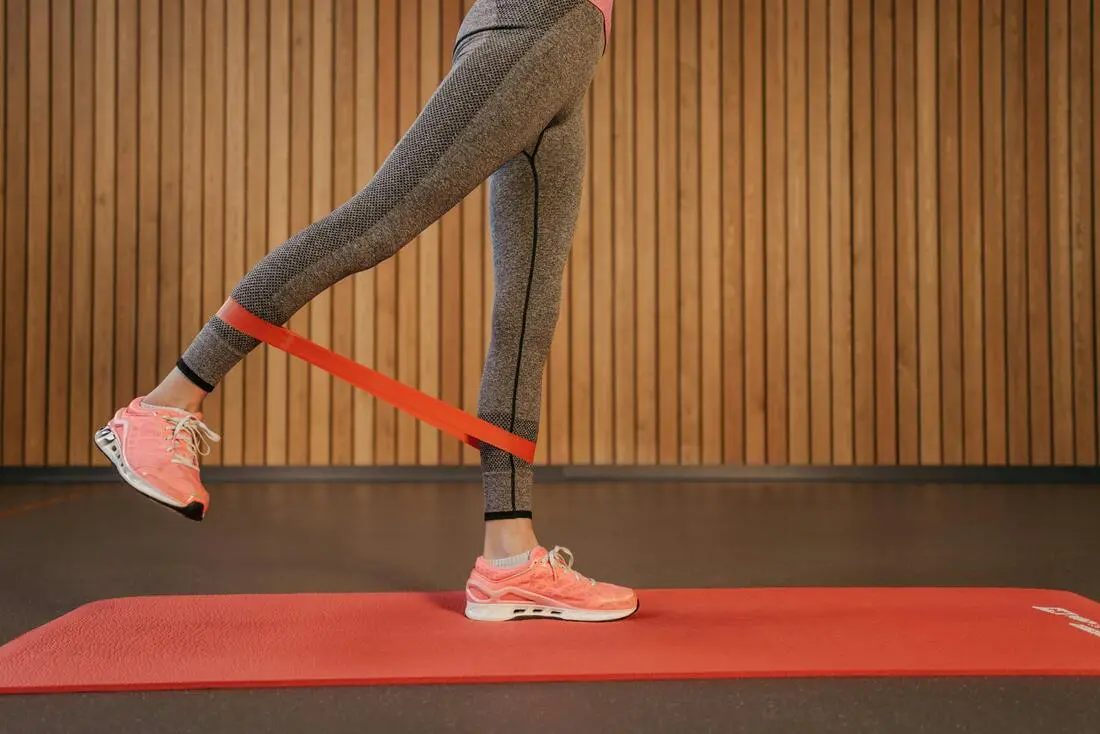
Stand tall with your feet hip-width apart, loop a mini band around your ankles.
Keeping your back straight and core engaged, kick one leg straight back, squeezing your glutes at the top.
Focus on slow and controlled movements.
Remember, quality over quantity, my friend!
Fire hydrants
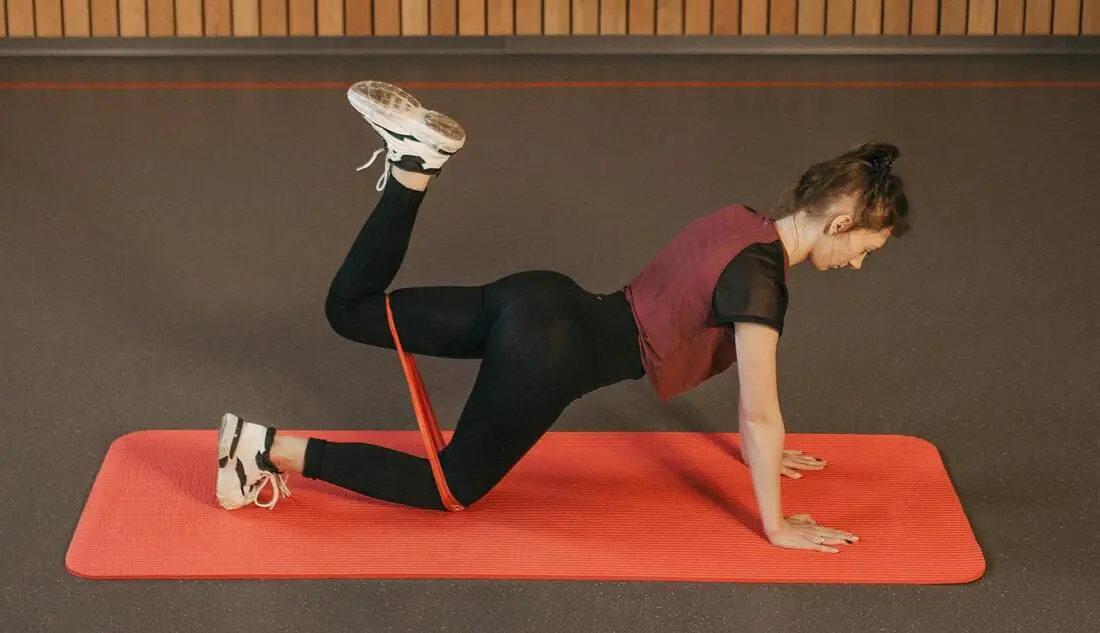
Get on all fours with a mini band just above your knees.
Keeping your core tight, lift one leg out to the side, like a dog at a fire hydrant (hence the name!).
Make sure your hips stay stable, and don’t rotate your body.
Clamshells
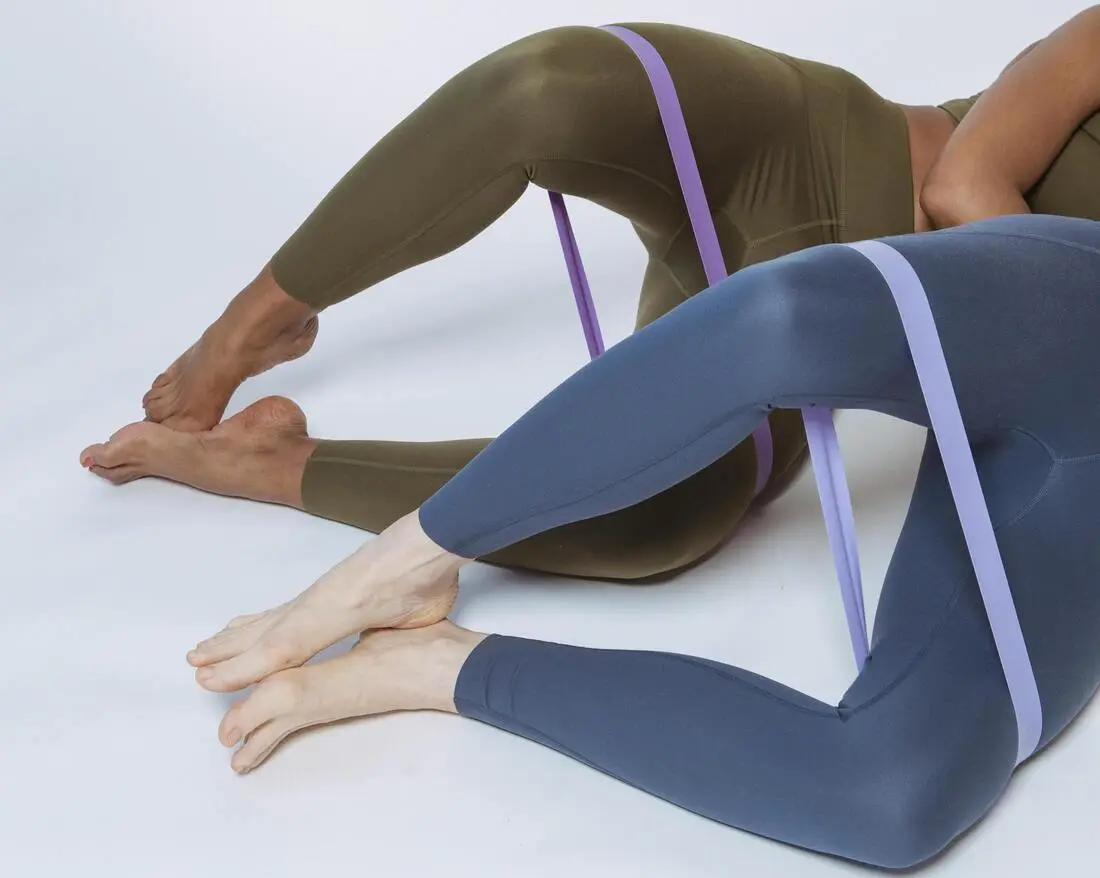
Lie on your side with your knees bent and a mini band around your thighs, just above your knees.
Keeping your feet together, lift your top knee toward the ceiling, feeling the burn in your outer glutes.
Remember to keep your hips stacked and don’t let your pelvis tilt backward.
Monster walks
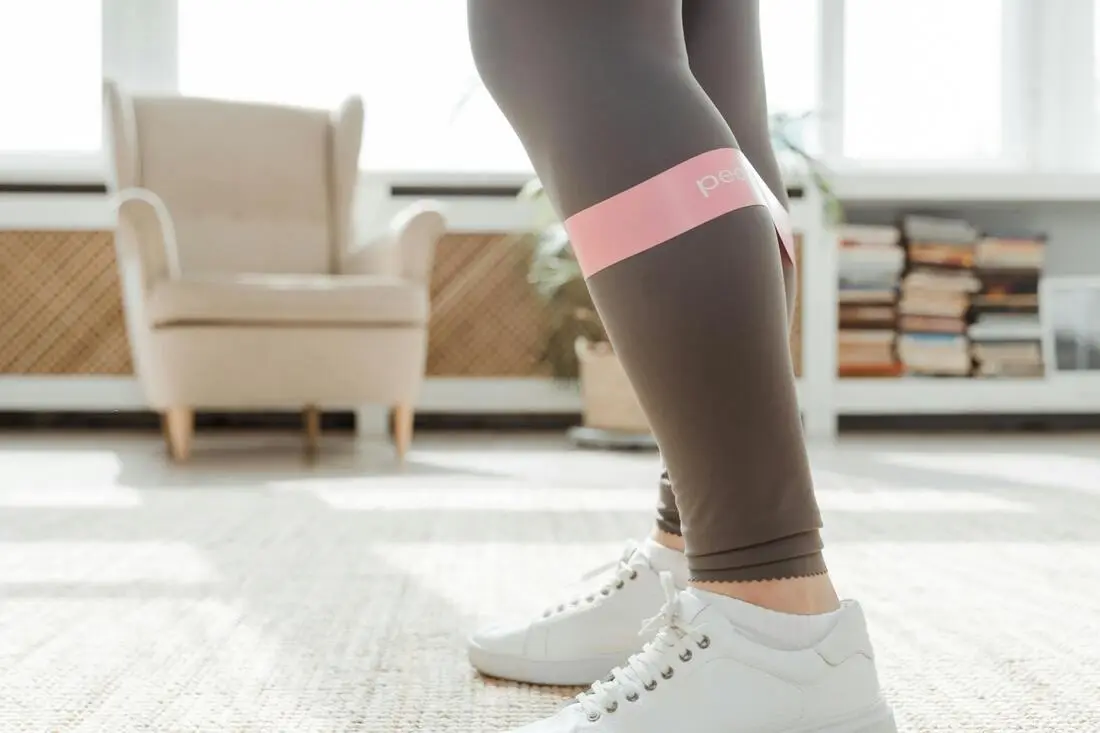
Loop a mini band around your ankles and stand with your feet hip-width apart.
Take small steps backward or sideways, maintaining tension in the band and keeping your hips low.
You’ll feel your glutes working overtime!
Quads – Power Up Your Thighs
Resistance band squats
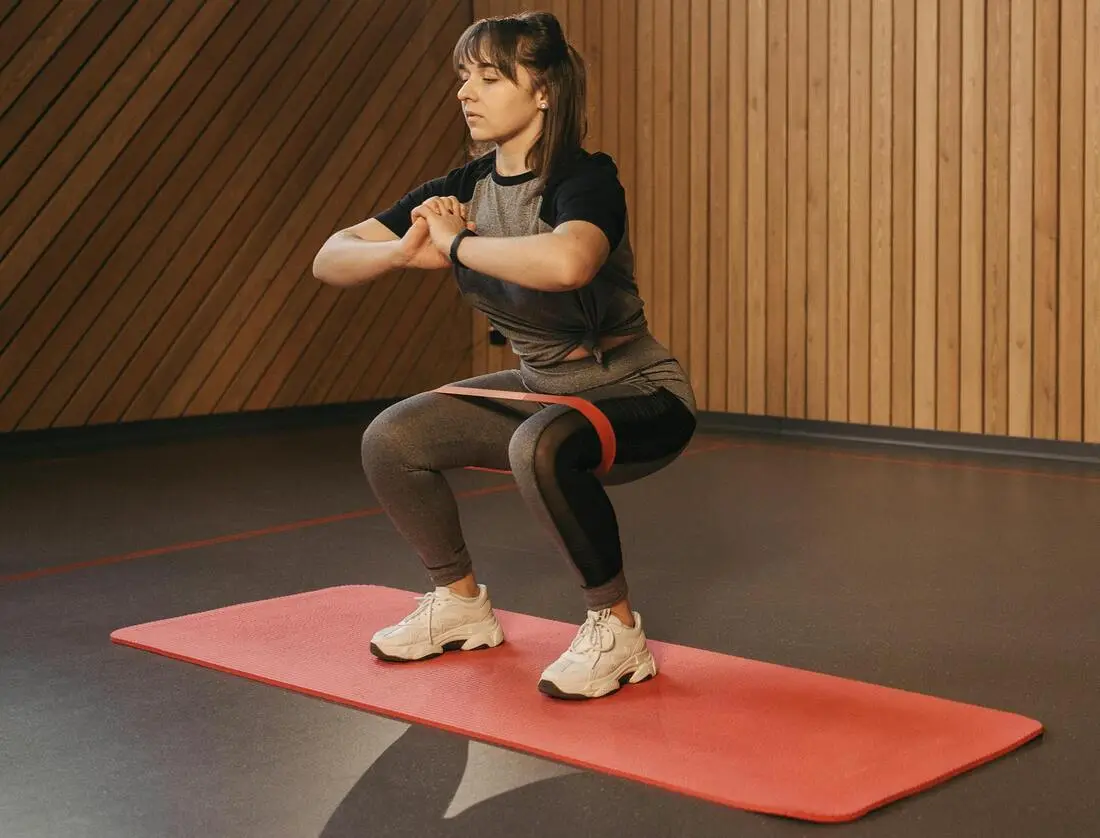
This classic exercise gets even better with a resistance band.
Loop a mini band around your thighs, just above your knees, and perform your squats as usual.
You’ll feel the extra resistance working those quads and keeping your knees aligned.
Lunges
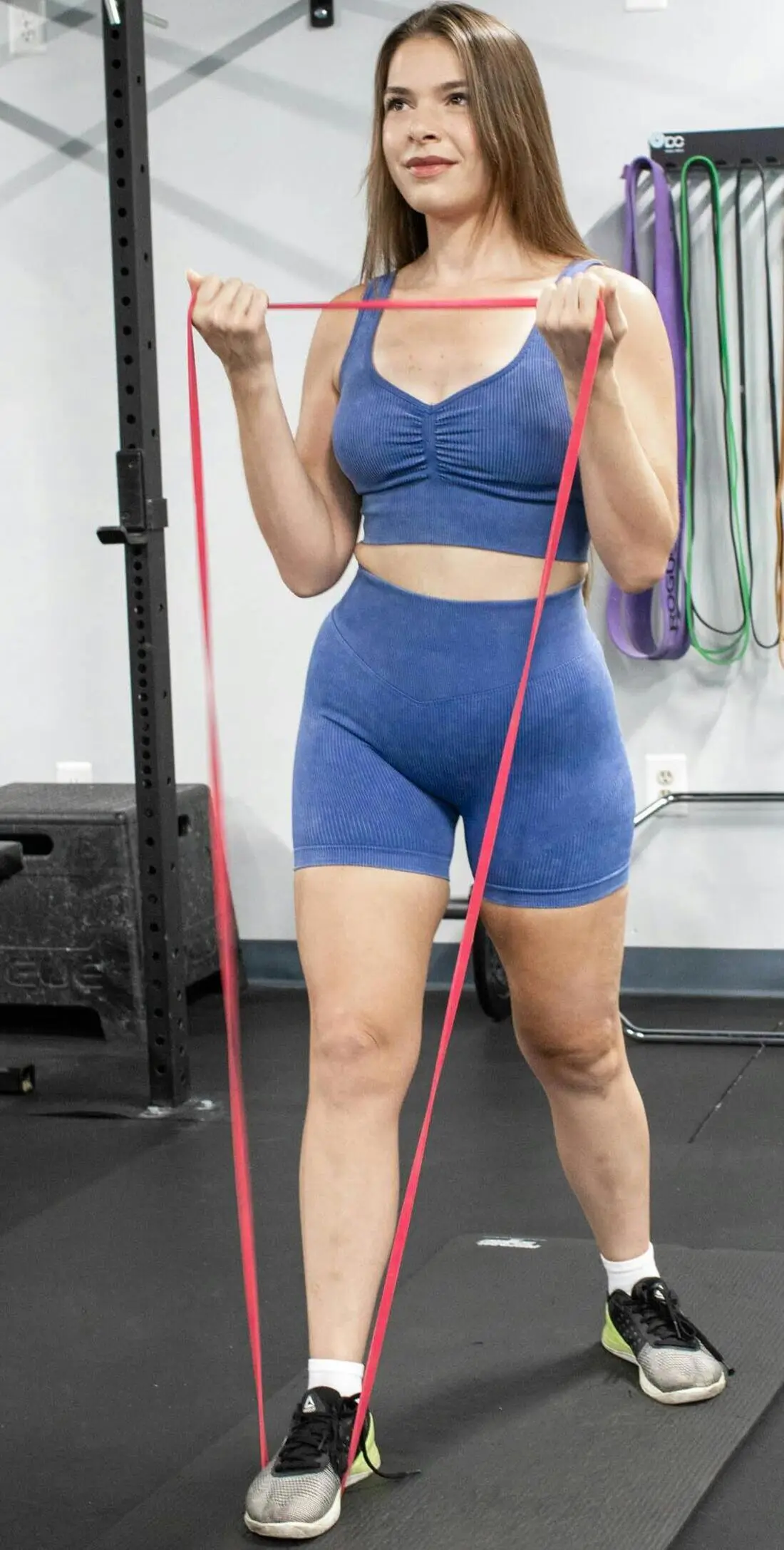
Step into a long loop band with one foot, holding the ends of the band at shoulder height.
Perform lunges, feeling the added resistance in your quads and glutes.
Remember to keep your front knee aligned with your ankle.
Leg extensions
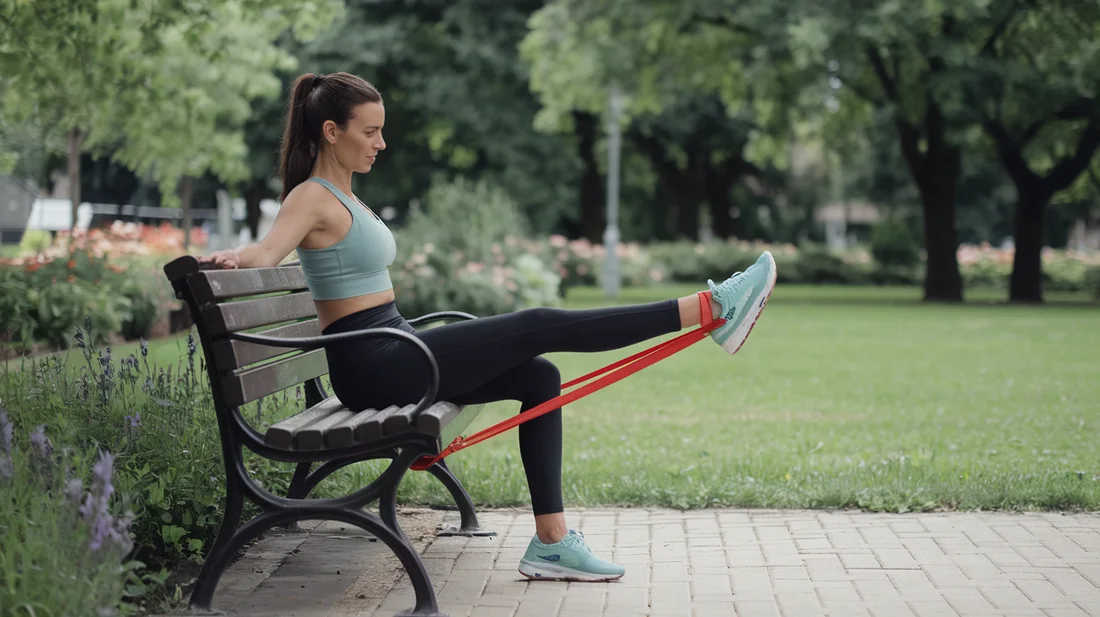
While sitting, loop a resistance band around your ankle, anchoring the other end to a sturdy object.
Extend your leg straight out, working against the resistance of the band.
Feel that quad burn!
Hamstrings – Build Strength and Flexibility
Romanian deadlifts

Stand on a long loop resistance band, holding the ends in each hand.
Hinge at your hips, keeping your back straight, and lower the weight towards the ground.
Feel the stretch in your hamstrings, then stand back up, squeezing your glutes.
Lying leg curls
Lie facedown with a resistance band looped around one ankle, anchoring the other end to a stable object.
Bend your knee, pulling your heel toward your glutes. You’ll feel the isolation in those hamstrings.
Inner and Outer Thighs – Tone and Stabilize
Lateral band walks
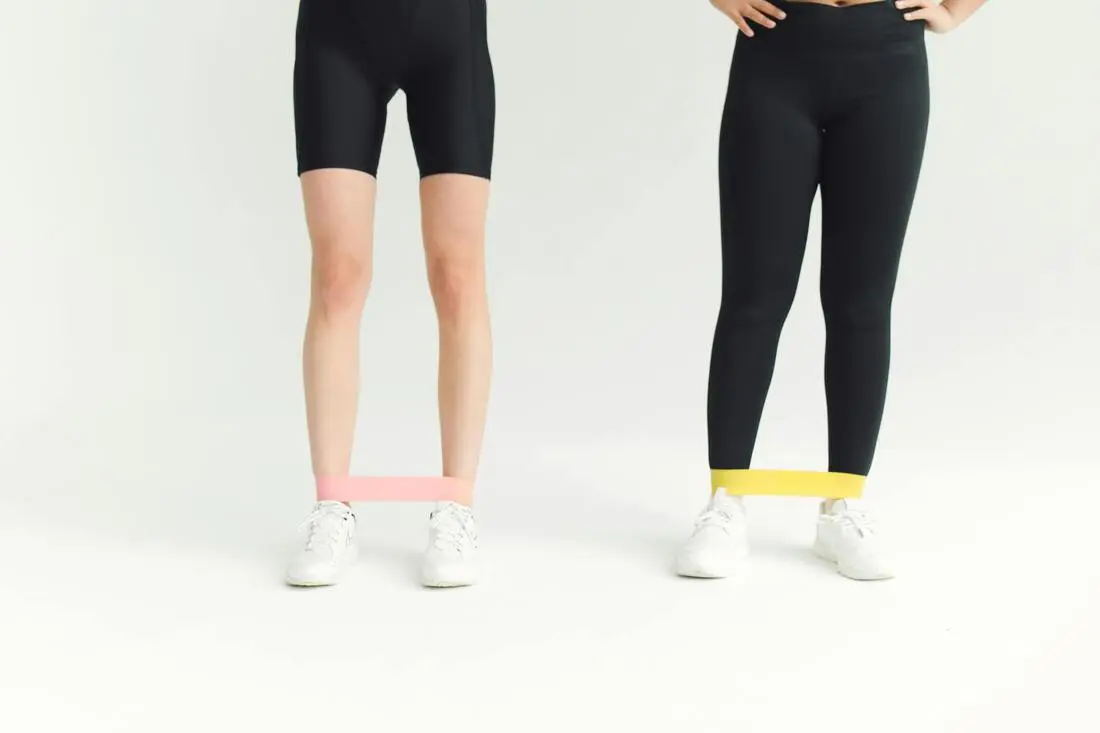
Place a mini band around your ankles and stand with your feet hip-width apart, knees slightly bent.
Take small steps sideways, maintaining tension in the band.
You’ll feel those inner and outer thighs working hard to stabilize your movements!
Standing abductions
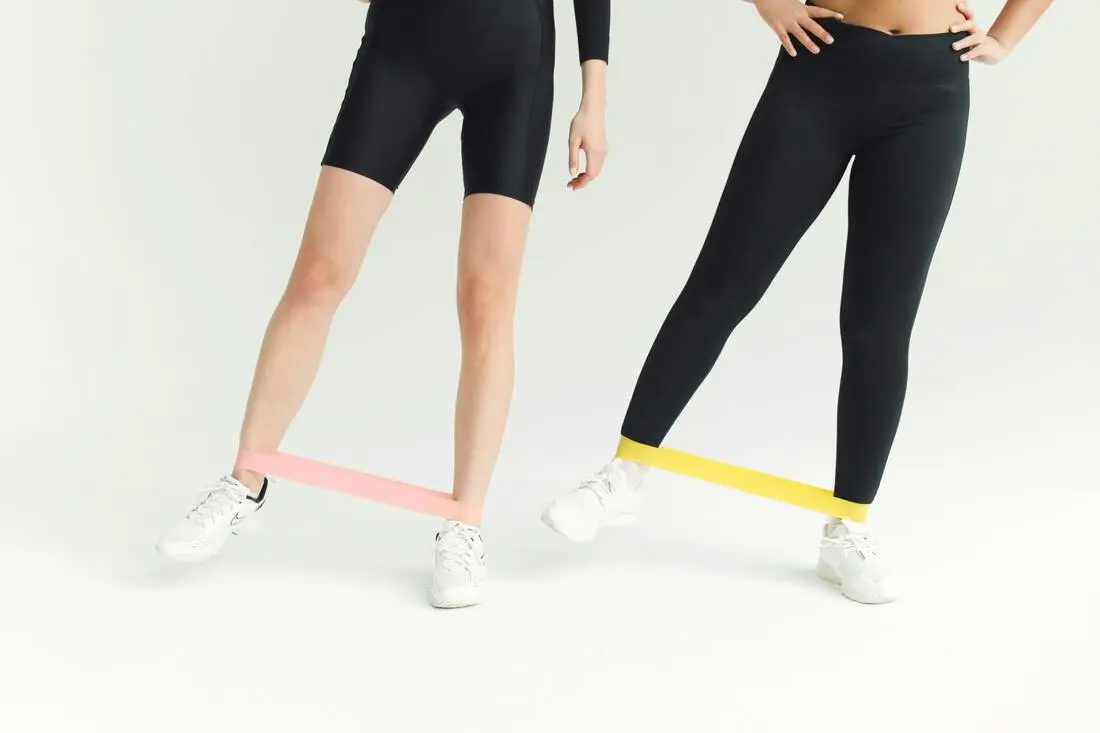
Stand tall with a mini band around your ankles.
Lift one leg out to the side, keeping your toes pointed forward and your core engaged.
It’s like a side leg raise with an extra challenge!
Side steps
Similar to lateral band walks, but instead of stepping continuously, you’ll step to the side and bring your feet together before repeating on the other side.
This variation really targets those outer thighs.
Warm-Up and Cool-Down – Prep and Recovery
Never skip your warm-up and cool-down, my friend!
Dynamic Warm-Up
- Leg swings: Swing your legs forward and backward, and then side to side, to loosen up those muscles and joints.
- Hip circles: Make circles with your hips in both directions to warm up your hip flexors and glutes.
- Bodyweight squats: Perform a few squats to get your blood flowing and activate your leg muscles.
Static Cool-Down
- Hamstring stretches: Reach for your toes or use a towel to assist you.
- Quad stretches: Grab your ankle and pull your heel towards your glutes.
- Butterfly stretches: Sit with the soles of your feet together and gently push your knees towards the floor.
Making It Work – Integrating Resistance Bands Into Your Routine
How often you train your legs with resistance bands depends on your fitness level and goals.
Aim for 2-3 times per week, allowing for adequate rest and recovery between sessions.
You can do a full-body workout, an upper/lower body split, or even dedicate specific days to legs.
The beauty of resistance bands is their versatility – they can be seamlessly incorporated into any routine!
Troubleshooting – Tips for a Smooth Workout
- Band roll-up: Ah, the dreaded roll-up! Try wearing longer pants or leggings, or adjust the band placement slightly higher or lower to find a comfortable position. You can also look for resistance bands with grippy surfaces to prevent slipping.
- Knee pain: Listen to your body and adjust exercises or resistance levels accordingly. If you’re experiencing knee pain, try reducing the resistance or adjusting your stance width. Make sure your knees are tracking over your toes during exercises like squats and lunges.
- Limited mobility: No worries! Start with a lighter band and gradually increase the range of motion as you become more flexible. You can also modify exercises or choose variations that accommodate your current range of motion.
Busting Myths – Resistance Bands Are Awesome
Some people think resistance bands are less effective than weights. But guess what?
Research suggests that resistance band training can lead to similar strength gains as traditional weight training!
Plus, they offer some unique advantages:
- Variable resistance: Resistance increases as the band stretches, which means your muscles work harder throughout the entire range of motion.
- Joint-friendly: Resistance bands are gentle on your joints, making them a great option for people of all ages and fitness levels.
Beyond Strength – The Full Package
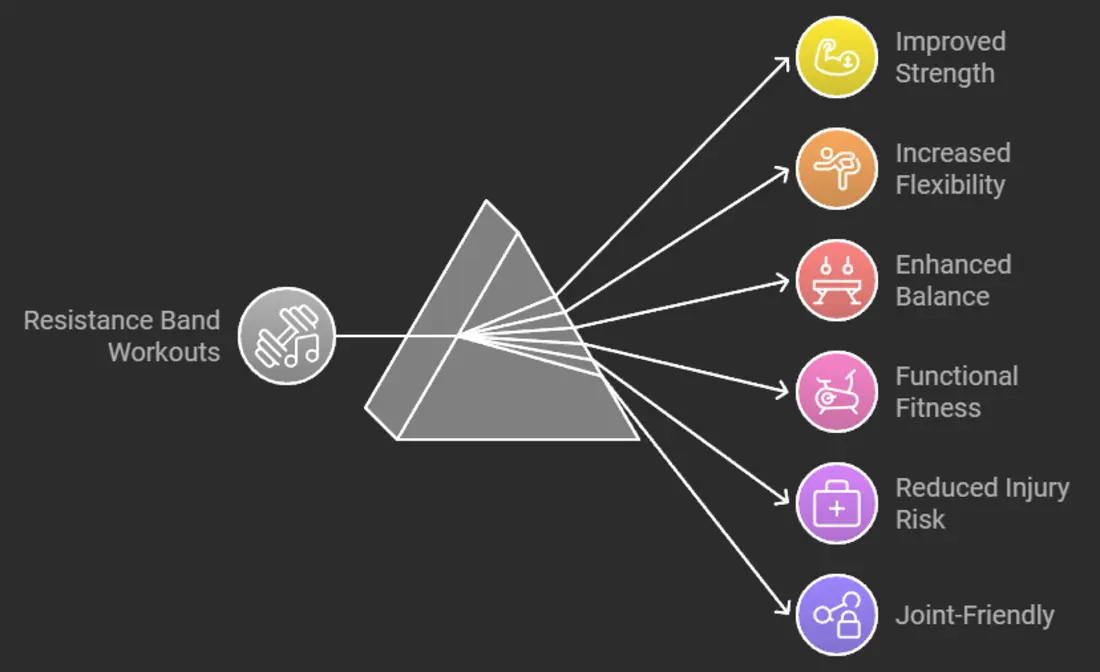
Resistance band leg workouts not only build strength but also:
- Improve flexibility and range of motion.
- Enhance balance and coordination.
- Increase functional fitness for everyday activities.
- Reduce your risk of injuries.
Ready to Unleash Your Leg Strength?
Resistance band leg workouts are a game-changer!
They’re effective, convenient, and versatile, making them perfect for anyone looking to tone, strengthen, and sculpt their legs.
So grab a band, follow these tips, and get ready to unleash your leg power!
You got this!
Related Posts

